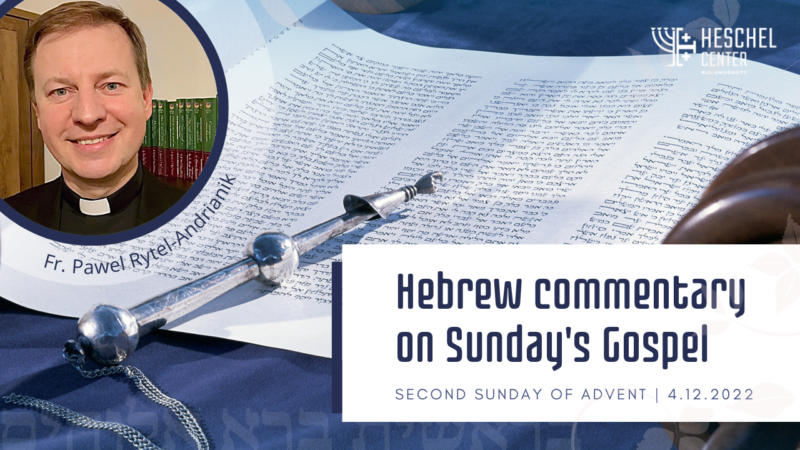Hebrew commentary on Sunday’s Gospel

PhotoCredit: KUL Heschel Center
„Convert” – has two different meanings in the Bible. The Hebrew „Shuv” means to turn from the wrong path and turn toward God. And the Greek „metanoeite” translates literally „change your thinking,” writes biblical scholar Fr. Pawel Rytel-Andrianik, deputy director of The Abraham J. Heschel Center for Catholic-Jewish Relations of The John Paul II Catholic University of Lublin, in his commentary for the Second Sunday of Advent.
When we say the word „conversion,” it has a defined meaning in a given language. The greatest richness of itssignificance is found in the Bible because the word contains both Hebrew and Greek meanings.
In the Gospel is written: “John the Baptist appeared, preaching in the desert of Judea and saying, „Cenvert, for thekingdom of heaven is at hand!”.
St. John the Baptist preached to the Jews. Most likely, when talking about repentance, he used the word „shuv” knownfrom the HebrewBible. It has a very practical meaning and is very figurative. The Hebrew word „shuv” simply means toturn back from the wrong path, which leads astray or into dangerous territory where one can lose one’s life. In addition, itmeans to turn back towards God, who is the source of happiness.
In the Gospel, the speech of St. John the Baptist is recorded in Greek. In turn, in this language, „metanoeite” is used todescribe the word”repent”. This word literally means „change your thinking”.
Importantly, the heart in the Bible does not refer to emotions so much, but precisely to the way of thinking. It is in theheart where a person makes choices and decisions. Therefore, a change of thinking, means a change in the heart of a person.
We can see, then, that the two meanings of the word „repent” are not opposite, but complementary.
When saying repent, the Gospel speaks at the same time of two principles: turn back and turn to God, and change yourthinking (heart). From which path should I turn back to God? On which matter should I change my thinking?
About the author
Fr. Paweł Rytel-Andrianik is a doctor in Oriental Studies of the University of Oxford and doctor in Biblical Sciences and Archeology of Studium Biblicum Franciscanum in Jerusalem. Former Spokesman of the Polish Bishops’ Conference (2015-2020). Currently director of the Office of Foreign Communication of the Polish Episcopate as well as vice director of The Abraham J. Heschel Center for Catholic-Jewish Relations of The John Paul II Catholic University of Lublin.


